Related Research Articles
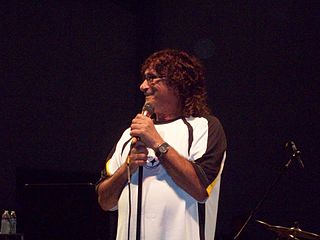
Donnie Iris is an American rock musician known for his work with the Jaggerz and Wild Cherry during the 1970s, and for his solo career beginning in the 1980s with his band, the Cruisers. He wrote the #2 Billboard hit, "The Rapper", with the Jaggerz in 1970 and was a member of Wild Cherry after the group had a #1 hit with "Play That Funky Music." He also achieved fame as a solo artist in the early 1980s with the #29 hit "Ah! Leah!" and the #37 hit "Love Is Like a Rock."
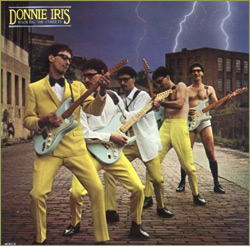
Back on the Streets is the debut album by American rock singer/guitarist Donnie Iris, released in 1980. The single "Ah! Leah!" was a hit for Iris, reaching #29 on the U.S. Billboard Hot 100 chart and #19 on the U.S. Billboard Top Tracks chart. The album was remastered and reissued on CD in 2021 by Rock Candy Records with two live bonus tracks from the 1981 Live EP.

King Cool is the second album by Donnie Iris, released in 1981. The album was reissued in remastered form on CD in 2021 by Rock Candy Records with a live bonus track from the 1981 Live EP.

No Muss...No Fuss is the fifth studio album by American rock singer Donnie Iris, released by HME in 1985.
The Jaggerz are an American rock band from Pittsburgh, Pennsylvania. They came to national attention with their single "The Rapper" which was released on the Kama Sutra label. "The Rapper" was No. 1 in the Record World Charts and No. 2 in the Billboard Hot 100 in March 1970. Having sold over one million copies, the recording received a gold record awarded by the R.I.A.A.

"The Rapper" is a song by The Jaggerz, written by band member Donnie Iris. Released as a single, it reached No. 2 on the Billboard Pop Singles chart, behind Simon & Garfunkel's smash "Bridge Over Troubled Water" on 20 March 1970, it reached No. 1 on the Record World Singles chart. It was certified Gold by the RIAA in 1970 for selling over a million copies.

"Ah! Leah!" is a song by Mark Avsec and American rock musician Donnie Iris from the latter's 1980 album Back on the Streets. The song has been described as Iris's signature song, as well the unofficial anthem of the city of Pittsburgh and Western Pennsylvania as a whole.

"Love Is Like a Rock" is a song by American rock musician Donnie Iris from his 1981 album King Cool. The song was released as the second single from his second album.
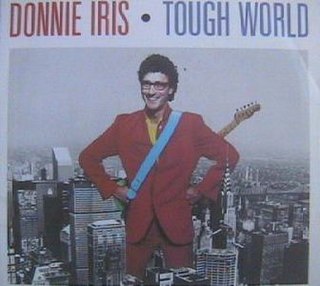
"Tough World" is a song by American rock musician Donnie Iris from his 1982 album The High and the Mighty. The song was released as a single the same year and reached #57 on the U.S. Billboard Hot 100, #63 on Cash Box, and #26 on the U.S. Billboard Mainstream Rock chart.

"Injured in the Game of Love" is a song by American rock musician Donnie Iris, released in 1985 as the lead single from his fifth studio album No Muss...No Fuss. The song reached number 91 on the US Billboard Hot 100 chart and number 28 on the US Billboard Mainstream Rock chart.
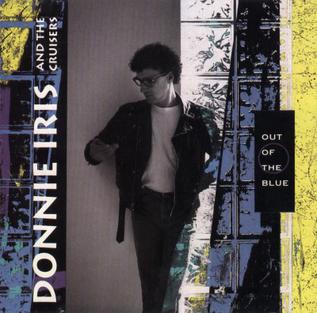
Out of the Blue is the sixth album by American rock singer Donnie Iris, released in 1992. The album is partly a 'best-of' collection as it consists of seven previously released tracks and six new songs. These six tracks were originally recorded for the band's unreleased 1986 album Cruise Control, and were remixed for this release.

Footsoldier in the Moonlight is the seventh studio album by American rock singer Donnie Iris, released by Seathru on September 9, 1993.
Poletown is the eighth studio album by American rock singer Donnie Iris, released in 1997. It was Iris' third post-major label release, and was released independently on Seathru Records.
Live! At Nick's Fat City is the first live album by American rock singer Donnie Iris, released in 1998. Nick's Fat City was a nightclub that was located in Pittsburgh in the South Side Flats neighborhood.
Mark Avsec is an American rock keyboardist, songwriter, and producer. He was a member of the funk rock band Wild Cherry.
Kevin Valentine is an American rock drummer who is best known for being a member of Donnie Iris and the Cruisers. Valentine played drums on all of the band's early albums during the 1980s. Valentine has recorded as a member of Breathless, The Innocent, Godz, Rosie, Shadow King, The Lou Gramm Band and Neverland. He also performed on the Kiss albums Hot In The Shade, Revenge and Psycho Circus, playing on all tracks but one on Psycho Circus. The one track he did not play was "Into the Void", performed by Ace Frehley. On Revenge, he played on one song, "Take It Off" and played on "You Love Me to Hate You" on Hot in the Shade. He was also a touring member of Cinderella. Valentine is also a sound mixer for many prominent TV shows, such as The Good Wife, Legion, Better Call Saul, El Camino: A Breaking Bad Movie, Ozark, and The Nevers.
Back on the Streets may refer to:
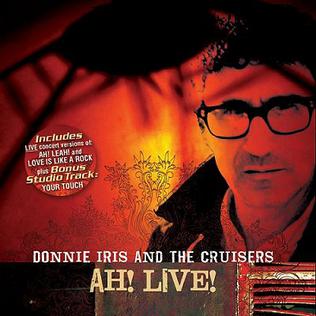
Ah! Live! is the second live album by American rock singer Donnie Iris, released in 2009. Except for one studio recording, all of the songs were recorded at live concerts in Kittanning and Erie, Pennsylvania. The album's name comes from Donnie's first hit single, "Ah! Leah!" It is his fifteenth solo album.
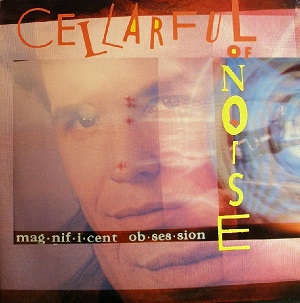
Magnificent Obsession is the second and final studio album from 1980s American pop-rock act Cellarful of Noise, a solo project of Mark Avsec of Donnie Iris fame. The album was released in March 1988, with some of the tracks featuring Donnie Iris on vocals.
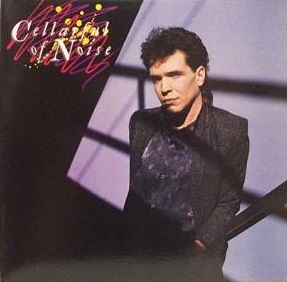
Cellarful of Noise is the debut studio album from 1980s pop-rock act Cellarful of Noise, a solo project of Mark Avsec of Donnie Iris fame. The album was released in June 1985.
References
- ↑ "Back On the Streets by Donnie Iris". Classic Rock Review. Retrieved 20 November 2024.